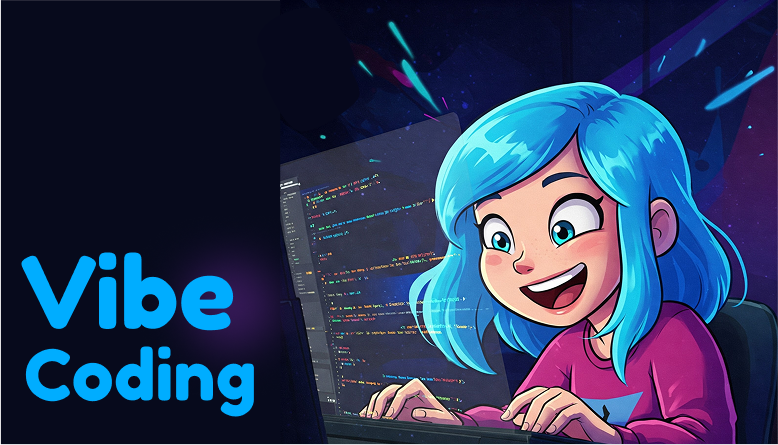Vibe coding is an AI-dependent programming technique where a person describes a problem in a few sentences as a prompt to a large language model (LLM) tuned for coding. Recently it's getting attention of in social media like Twitter/X.
Vibe coding recently went trending on twitter/X after some influencer tried making fully fledged games and apps with LLMs like Claude 3.7 Sonnet or Google's new Gemini Flash. Now people from different
The world of software development is constantly evolving, and the latest buzzword making the rounds is "vibe coding." Powered by the rapid advancements in AI, particularly large language models (LLMs), vibe coding promises to revolutionize how we build software. But is it a genuine leap forward, or a recipe for disaster? Let's delve into the heart of this intriguing concept.
What Exactly is Vibe Coding?
Imagine telling a computer, in plain English, what you want it to do, and it magically writes the code for you. That's essentially the premise of vibe coding. Instead of meticulously crafting lines of code, developers use natural language prompts to instruct AI tools to generate the desired functionality.
This approach leverages the power of LLMs, which are trained on vast datasets of code and text, enabling them to understand and translate human language into executable code. Tools like Replit's AI coding agents are at the forefront of this movement, offering a glimpse into the future of software development.
The Promise of Vibe Coding: A New Era of Accessibility?
Proponents of vibe coding highlight its potential to democratize software development. By lowering the barrier to entry, it could empower individuals with limited coding experience to bring their ideas to life. This could lead to a surge in innovation and creativity, as more people are able to participate in the development process.
Furthermore, it promises to accelerate development cycles. By automating the tedious task of writing boilerplate code, developers can focus on higher-level tasks, such as architecture, design, and problem-solving.
The Perils of Vibe Coding: A Breeding Ground for Bad Code?
However, the rosy picture painted by its proponents is not without its shadows. Critics raise valid concerns about the potential for vibe coding to produce "bad code."
- Lack of Understanding: Relying on AI to generate code without a deep understanding of the underlying principles can lead to opaque and difficult-to-maintain codebases.
- Debugging Nightmares: Debugging AI-generated code can be a daunting task, especially if the developer doesn't fully grasp its inner workings.
- Security Vulnerabilities: AI models are not immune to errors, and they can potentially generate code that contains security vulnerabilities.
- Dependence and Skill Erosion: Over-reliance on AI tools may lead to a decline in fundamental coding skills, hindering developers' ability to solve problems independently.
- Ethical Concerns: Issues around code ownership, intellectual property, and potential biases in the AI models themselves are also significant concerns.
The Verdict: A Tool, Not a Replacement
The reality is that vibe coding is likely to be a tool, not a complete replacement for traditional coding. Like any tool, its effectiveness depends on how it's used.
- It can be valuable for generating boilerplate code, prototyping, and automating repetitive tasks.
- However, it's crucial to maintain a strong understanding of coding principles and best practices.
- Careful review and testing of AI-generated code are essential to ensure quality and security.
The Future of Software Development
Vibe coding is undoubtedly a fascinating development, and it will continue to evolve as AI technology advances. The key is to embrace it responsibly, recognizing its potential while mitigating its risks.
The future of software development will likely involve a hybrid approach, where developers work in collaboration with AI tools, leveraging their strengths to create innovative and robust applications. The developer’s role will shift to a more high level role of architecture, and system design, while AI handles the more mundane coding tasks.
Ultimately, the question of whether vibe coding is a boon or a bane depends on how we choose to use it. It's up to us to ensure that it becomes a powerful tool for good, rather than a source of bad code.
Takeaways
It's easy to create boilerplate code for AI models now but creating an entire project with AI seems a lot of works. Just take for example ask an AI to create a TODO list App in HTML, CSS and JavaScript. It will work fine. But now tell it to do the same thing but with cloud sync integration, cross platform mobile app, it will probably still be able to accomplish the goal but you(as a human) will not understand what the code is doing, which in turns leads of bad code i.e exposing security keys, security threats, bugs and yeah good luck updating anything in the code because you can't write it so you can't read it.
I always tell everyone that, use AI's code only when you understand what it's doing, for instance "Generate me a function to convert Epoch Timestamp into Local ISO Format" . It saves you time. But, asking AI to build an entire app on behalf of you will not be a good idea at all.
